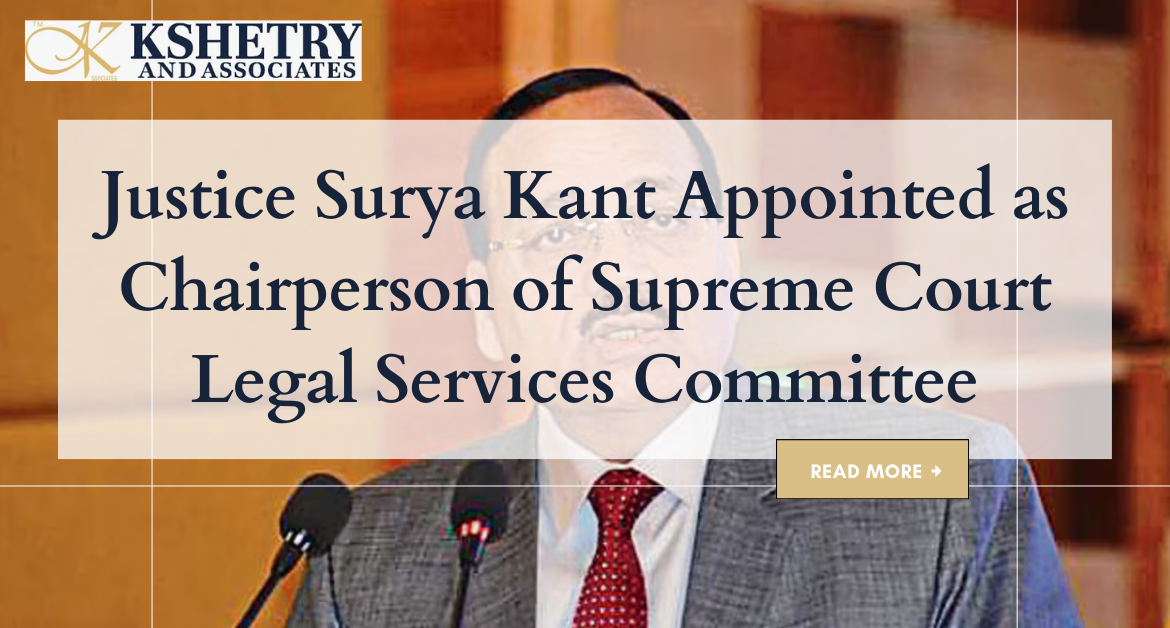Recently, an essential step in enhancing legal aid for marginalized populations has been taken with the nomination of Justice Surya Kant as the Chair of the Supreme Court Legal Services Committee (SCLSC). Chief Justice of India (CJI) Sanjiv Khanna made this decision following Section 3A of the Legal Services Authorities Act, 1987, formally announced on November 12, 2024.
The National Legal Services Authority (NALSA) Executive Chairperson, Justice B.R. Gavai, was replaced by Justice Surya Kant. This seamless transfer between the two titans of the judiciary demonstrates the judiciary’s commitment to enhancing access to justice for the country’s poor residents.
A New Phase in Legal Aid Provision
The SCLSC is essential in ensuring social or economic limitations do not prevent people from accessing justice. It offers free legal aid and support to people who go to the Supreme Court for justice, especially women, people from underprivileged origins, and other marginalized groups.
Justice Surya Kant, renowned for his honesty and awareness of social issues, is anticipated to give these initiatives fresh direction. He is qualified to lead the SCLSC because of his extensive judicial expertise and sympathetic demeanor. Under his direction, the committee will probably take creative steps to broaden its scope and efficacy.
Justice Surya Kant’s appointment comes at a crucial time for the judiciary, which is working to close the gap between society’s rich and poor. Legal aid organizations such as the SCLSC and NALSA play crucial roles in providing fair access to justice, and effective leadership is required to achieve this goal.
Justice Gavai’s Transition to NALSA
The judiciary’s deliberate focus on developing a solid legal aid structure is reflected in Justice B.R. Gavai’s transfer to NALSA. As NALSA’s Executive Chairperson, Justice Gavai will supervise the execution of several programs intended to offer legal aid at the local level.
Justice Gavai played a crucial role in furthering the SCLSC’s objective of offering legal assistance in intricate and consequential Supreme Court issues when he was employed there. His move to NALSA enables the judiciary to continue its larger goal of providing legal aid to underprivileged areas.
An Insight into the Future of Justice Surya Kant
Justice Surya Kant’s career path has been distinguished. He is currently a Supreme Court judge and is well known for advocating for inclusivity and social justice. As the Chairperson of the SCLSC, he has the opportunity to directly influence the lives of innumerable people seeking justice at the nation’s highest court.
Notably, on November 23, 2025, Justice B.R. Gavai is scheduled to retire, and Justice Surya Kant is anticipated to take over as Chief Justice of India. His term as CJI, which ends on February 9, 2027, is expected to further the judiciary’s endeavors to provide prompt and equitable justice.
His leadership of the SCLSC can be seen as a prelude to more significant reforms and initiatives that he can support as head of the Indian judiciary.
Final Words
The nomination of Justice Surya Kant as Chair of the Supreme Court Legal Services Committee is significant in India’s legal history. Under his direction, there will be a renewed emphasis on giving the poor access to justice, consistent with the judiciary’s mission of justice and inclusivity.
All eyes will be on his efforts to fortify the legal aid system as he prepares to assume this important position. The judiciary’s dedication to “justice for all” is set to advance significantly in the years to come, with Justice B.R. Gavai leading NALSA and Justice Surya Kant leading the SCLSC.
Also Read: Employment Law in India: Employee Rights and Employer Obligations

